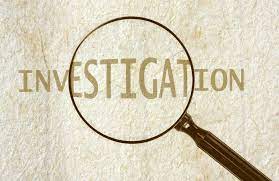Many of us are busy striking items from our ‘Important and Urgent’ to do lists, as holidays approach, or business deadlines loom large. Thankfully, most of us have a degree of planning capability in our work lives, but one thing that we can never predict, is an incident or accident, which by their very nature tend to come out of the blue, meaning we need to drop everything and put on our investigators hat!
Carrying out an effective internal investigation is an often overlooked, but essential skill for Managers, who have to be able to investigate a whole range of issues, anything from discipline or grievance cases, accidents at work, through to customer complaints or quality failings.
Not conducting internal investigations can lead to significant challenges for your business, including potential legal liabilities, a decrease in employee morale due to perceived neglect of grievances, and damage to the Organisation’s reputation. We are in an era where negative news travels fast, and chances to identify and rectify identified systemic issues could be missed.
ACAS provide helpful guidance on how to investigate workplace investigations. Although their focus is purely on employment matters, their summary of the principle stages is well worth applying.
ACAS 6 Steps to Conducting Workplace Investigations
- Decide if an Investigation is Necessary: Not all complaints require a full investigation. Some can be resolved informally.
- Plan the Investigation: Determine the scope, which should be proportionate to the allegation. Decide who will conduct it and what resources they’ll need.
- Collect the Evidence: This includes documents, CCTV footage, or any other relevant materials. Interviews should be conducted with those involved and any witnesses.
- Analyse the Evidence: Consider all the evidence impartially, and decide if it’s sufficient to make a decision.
- Write a Report: Document findings, including all evidence, interview transcripts, and a conclusion. This will be crucial for any subsequent steps.
- Decide on Action: After the investigation is complete, based on the report, determine if any action, such as disciplinary action, needs to be taken.
As a prelude to further action, which may vary from a customer complaint being upheld, through to commencing a formal disciplinary, dismissal or grievance process with your employees, getting your investigations wrong can have significance consequences.
Our Top Recommendations for Effective & Thorough Investigations
- Be Impartial and Objective: Investigators should not have any stake in the outcome. Consider third-party investigators if necessary.
- Maintain Confidentiality: Protect the privacy of all involved parties to the greatest extent possible.
- Document Thoroughly: Every step, from initial complaints to interviews and findings, should be meticulously recorded.
- Seek Expert Advice: When in doubt, consult with BackupHR to ensure the investigation is robust and compliant.
Being a good investigator is more of a science than an art and requires a good skills-set of listening and questioning skills, as well as a tenacious ability to get to the truth rather than assume what the outcome is, and then look solely for the evidence to support that theory.
We have given you some useful points to consider in this article, but to ensure you and your Managers are trained and skilled to competently deal with workplace investigations, you may want to consider booking yourself and/or your team onto our upcoming training course on this subject.
Conducting Investigations
Wednesday 18th October 2023 – Quy Mill Hotel & Spa, Quy, Cambridge
Equip your Managers with the principles and practical skills to conduct a thorough and fair investigation with confidence.
Registration and refreshments from 8.00 a.m., with the course commencing at 8.30 a.m. and finishing around 1.30 p.m., Lunch and refreshments provided.
The cost for this course will be £165.00 plus VAT per delegate, including lunch. Preferential rates for clients
To reserve a place, contact Jackie Bolton, either by e-mail: jackie@backuphr.com or call 01480 677981.
Clients are welcome to raise any concerns with our team of Consultants, who will be pleased to advise you on any element of the issues arising from this newsletter.


